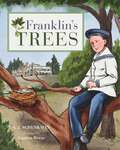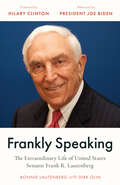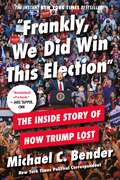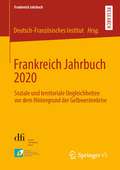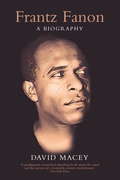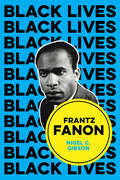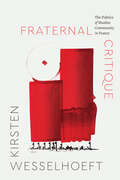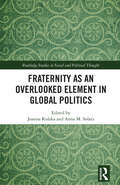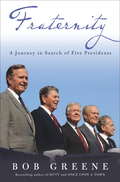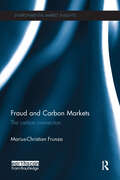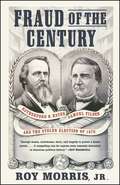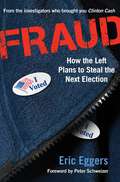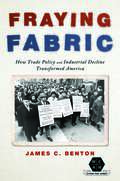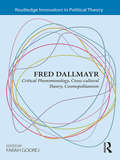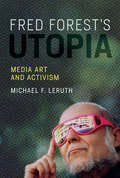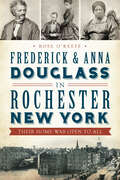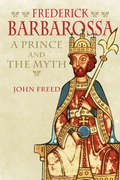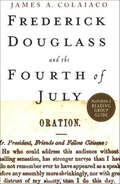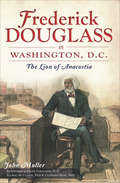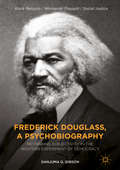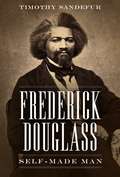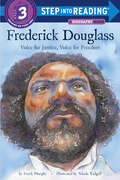- Table View
- List View
Franklin's Trees
by A.J. Schenkman&“All that is within me cries out to go back to my home on The Hudson River,&” President Franklin Roosevelt once declared. For it was at his home in Hyde Park, New York that FDR could indulge in his favorite avocation—&“tree farmer.&” This book introduces children to FDR&’s love of nature through a lifetime in which he oversaw the planting of over a million trees on his estate. It tells of a childhood hiking the trails through his forest, later widening those trails into roads after polio deprived him of the use of his legs and only able to get around by car. It describes the creation of the Civilian Conservation Corps during the Great Depression, which came to be known as &“Roosevelt&’s Tree Army.&” It also tells the story of how FDR sent England&’s Prime Minister Winston Churchill a Norway spruce one Christmas to cheer up the English people. Today, FDR&’s love of trees is remembered at the Franklin D. Roosevelt Historic Site in Hyde Park, New York, where many of the trees he planted still rise on the grounds and surrounding forest.
Frankly Speaking: The Extraordinary Life of United States Senator Frank R. Lautenberg
by Bonnie LautenbergFrank Lautenberg was the embodiment of the American dream. The son of Eastern European immigrants who toiled in the factories of northern New Jersey, he rose to become a Fortune 500 CEO and eventually a five-term US senator. Yet his is not a simple rags-to-riches tale, but is rather the story of someone who used his newfound affluence and influence to improve the lives of ordinary Americans. Told by one of the people who knew him best, his widow Bonnie, Frankly Speaking reveals the political strategies that made Lautenberg one of the Senate’s most powerful advocates for the health and safety of America’s citizens. He championed seemingly minor, unglamorous reforms that made a big difference to everyday lives, from raising the national drinking age to preventing domestic abusers from purchasing guns. These campaigns earned him powerful enemies in the alcohol, tobacco, and firearms industries, and he was subjected to some of the most brutal campaign mudslinging in American history. Yet, as this inspiring biography reveals, New Jersey’s longest-serving senator was not afraid to take big political risks if it meant standing up for his principles, whether that meant opposing the Iraq War or protecting LGBTQ and women’s rights.
Frankly, We Did Win This Election: The Inside Story of How Trump Lost
by Michael C. BenderMichael C. Bender, senior White House reporter for the Wall Street Journal, presents a deeply reported account of the 2020 presidential campaign that details how Donald J. Trump became the first incumbent in three decades to lose reelection—and the only one whose defeat culminated in a violent insurrection. <P><P>Beginning with President Trump’s first impeachment and ending with his second, FRANKLY, WE DID WIN THIS ELECTION chronicles the inside-the-room deliberations between Trump and his campaign team as they opened 2020 with a sleek political operation built to harness a surge of momentum from a bullish economy, a unified Republican Party, and a string of domestic and foreign policy successes—only to watch everything unravel when fortunes suddenly turned. <P><P>With first-rate sourcing cultivated from five years of covering Trump in the White House and both of his campaigns, Bender brings readers inside the Oval Office, aboard Air Force One, and into the front row of the movement’s signature mega-rallies for the story of an epic election-year convergence of COVID, economic collapse, and civil rights upheaval—and an unorthodox president’s attempt to battle it all. Fresh interviews with Trump, key campaign advisers, and senior administration officials are paired with an exclusive collection of internal campaign memos, emails, and text messages for scores of never-before-reported details about the campaign. <P><P>FRANKLY, WE DID WIN THIS ELECTION is the inside story of how Trump lost, and the definitive account of his final year in office that draws a straight line from the president’s repeated insistence that he would never lose to the deadly storming of the U.S. Capitol that imperiled one of his most loyal lieutenants—his own vice president. <P><P><b>A New York Times Best Seller</b>
Frankreich Jahrbuch 2020: Soziale und territoriale Ungleichheiten vor dem Hintergrund der Gelbwestenkrise (Frankreich Jahrbuch)
by Deutsch-Französisches InstitutDas vorliegende Frankreich Jahrbuch gibt einen Überblick über soziale und territoriale Unterschiede in Deutschland und Frankreich. Diese betreffen die Lebensrealität einzelner Bevölkerungsgruppen ebenso wie den Zugang zu Dienstleistungen des täglichen Lebens und der öffentlichen Daseinsvorsorge. Ausgangspunkt ist Frankeich, wo das Thema verbunden mit der Gelbwestenbewegung ins Zentrum politischer Aufmerksamkeit gerückt ist. Neben einer empirischen Bestandsaufnahme bestehender Ungleichheiten und ihrer Folgen werden anhand konkreter Fallbeispiele Herausforderungen und Lösungsansätze diskutiert.
Frankreich. Wirtschaft, Gesellschaft, Politik, Kultur, Mentalitäten: Eine landeskundliche Einführung
by Hans-Jürgen LüsebrinkDas weitere Erstarken rechter Parteien und die Corona-Pandemie haben zu politischen und wirtschaftlichen Konflikten in Frankreich geführt. Doch was sind die Hintergründe der aktuellen Situation, wie ist die französische Gesellschaft strukturiert, wie funktioniert das politische System? – Diese Einführung beschreibt die politischen, wirtschaftlichen, sozialen, kulturellen und mentalen Strukturen, die die gegenwärtige Situation der französischen Gesellschaft prägen und vermittelt ein grundlegendes Verständnis für unser Nachbarland. Ausführlich beschäftigt sich der Autor mit dem historischen Gedächtnis Frankreichs, den Medien, den Kulturinstitutionen sowie mit den für Frankreichs Kulturpolitik wichtigen Bezügen zu den frankophonen Staaten und Kulturen außerhalb Europas. – Für die fünfte Auflage wurde der Band umfassend aktualisiert und erweitert.
Frantz Fanon
by David MaceyBorn in Martinique, Frantz Fanon (1925-61) trained as a psychiatrist in Lyon before taking up a post in colonial Algeria. He had already experienced racism as a volunteer in the Free French Army, in which he saw combat at the end of the Second World War. In Algeria, Fanon came into contact with the Front de Libération Nationale, whose ruthless struggle for independence was met with exceptional violence from the French forces. He identified closely with the liberation movement, and his political sympathies eventually forced him out the country, whereupon he became a propagandist and ambassador for the FLN, as well as a seminal anticolonial theorist.David Macey's eloquent life of Fanon provides a comprehensive account of a complex individual's personal, intellectual and political development. It is also a richly detailed depiction of postwar French culture. Fanon is revealed as a flawed and passionate humanist deeply committed to eradicating colonialism.Now updated with new historical material, Frantz Fanon remains the definitive biography of a truly revolutionary thinker.
Frantz Fanon: Combat Breathing (Black Lives)
by Nigel C. GibsonRevolutionary humanist and radical psychiatrist Frantz Fanon was one of the greatest Black thinkers of the twentieth century. Born in Martinique and known for his involvement in the Algerian liberation movement, his seminal books Black Skin, White Masks and The Wretched of the Earth are widely considered to be cornerstones of anti-colonial and anti-racist thought.In this essential introduction to Fanon’s remarkable life and philosophy, Nigel C. Gibson argues that Fanon’s oeuvre is essential to thinking about race today. Connecting Fanon’s writing, psychiatric practice, and lived experience in the Caribbean, France, and Africa, Gibson reveals (with startling clarity) his philosophical commitments and the vision of revolution that he stood for. Despite his untimely death, the revolutionary pulse of Fanon’s ideas has continued to beat ever more strongly in the consciousness of successive revolutionary generations, from the Black Panthers and the Black Power to Black Lives Matter.As Fanon’s thought comes alive to new activists thinking about their mission to “humanize the world,” Gibson reminds us that that Fanon’s revolutionary humanism is fundamental to all forms of anti-colonial struggle, including our own.
Fraternal Critique: The Politics of Muslim Community in France (Class 200: New Studies in Religion)
by Kirsten WesselhoeftAn exploration of ways that discord binds rather than divides communal life, through an ethnography of French Muslim activism. The conversation about Islam in France is framed by the presumption that Muslim communities are a threat to secular solidarity or fraternité. In the face of state repression, French Muslims have not closed ranks around a narrow range of voices; instead, Kirsten Wesselhoeft finds that young Muslim activists have continued to purposefully spark debate about the values that anchor community life. Wesselhoeft argues that such disagreements, far from dividing communities, actually constitute a form of belonging. Some activists call this ethic “fraternal critique,” and Wesselhoeft finds in it profound insights about the place for critique in civic life. The French state has reacted to Muslim solidarity with repression, but Wesselhoeft argues that unity need not come at the expense of dissent. Instead, fraternal critique can teach us how to build communities that are worth fighting over and fighting for.
Fraternity as an Overlooked Element in Global Politics (Routledge Studies in Social and Political Thought)
by Joanna Kulska Anna M. SolarzThis collection of chapters explores the often-overlooked concept of fraternity, positioning it alongside freedom and equality as a vital pillar of political discourse from its ancient origins to contemporary practice.In a comprehensive framework, the book delves into fraternity's evolving meanings, contexts and functions across Western and non-Western settings. It highlights fraternity's relational dimension, examining it as a term that overlaps with solidarity, community and civic friendship. The contributors investigate fraternity from three key perspectives: its ambivalence and complexity rooted in the tension between inward and outward orientations, and its dual presence in secular and religious discourse. By uncovering these layers, the chapters reveal how fraternity continues to shape and redefine our social and political landscapes.Targeted towards students, academics and general readers, this thought-provoking anthology invites readers to reconsider the importance of fraternity in modern society and its potential to foster connections in an increasingly fragmented world.
Fraternity: A Journey in Search of Five Presidents
by Bob Greene"What if you set off on a vacation trip in search of history--and your destination was the men who had been president?" Asking himself that tantalizing question, bestselling author and award-winning journalist Bob Greene embarked on a long journey across the breadth of the nation, hoping to spend time with Richard Nixon, Gerald Ford, Jimmy Carter, George Bush and Ronald Reagan. The result of his odyssey is Fraternity. Rich with the sounds of the presidents' own voices, Fraternity is dramatic, surprising, funny, revealing, inspiring, tragic, touching and unforgettable: a story destined to be read and enjoyed not just now, but far into the future as Americans think about who we are as a people.Here is Nixon, in an unmarked office high above Manhattan, explaining the reason for his solitary walks through New York streets at 5:30 every morning. Here is Carter, riding in a Secret Service van, recalling the sting of his family's being mocked for their rural Southern heritage, even after he had won the White House. Here is Ford, beside a golf course fairway, laughing at his startled discovery that of all his presidential papers, the one worth the most on the open market was a letter from a woman who tried to kill him. Here is Bush, on the road with his son, remembering his despair and anger at encountering a swastika carved into the sand behind an elegant resort on American soil. And here is Nancy Reagan, in a Beverly Hills hotel, on the haunting first night she must stand in for her husband after the announcement of his illness.A travelogue of the national spirit that chronicles a quest stretching over fifteen years and starring the biggest names in the modern American saga, this is living history of the most human kind, and Bob Greene at his very best.
Fraud and Carbon Markets: The Carbon Connection (Environmental Market Insights)
by Marius-Christian FrunzaThe VAT Carousel Fraud has seriously undermined the financial integrity of the European Union Emissions Trading Scheme (EU ETS). This timely book is the first to give an overview of fraud in the carbon market. Written by a former broker, it presents unique material on the carbon fraud mechanics and analyses the missing trader fraud (VAT fraud) on European carbon allowances markets with a focus on financial and organised crime issues. Fraud and Carbon Markets: The Carbon Connection assesses the weaknesses of the Kyoto Protocol and environmental markets, using statistics as a forensic tool on the capital markets. It describes specific cases, the court investigations and various mechanisms. It addresses issues of money laundering and international fraud on capital markets, such as stock manipulation, by exploring the financial mechanisms of the fraud, their impact on the market behaviour and the consequences on their econometric features. Researchers and students in climate change policy, environmental finance, financial law, organised crime, forensic statistics, financial regulation and risk management as well as financial regulators and policy makers will find this book of great interest.
Fraud of the Century: Rutherford B. Hayes, Samuel Tilden, and the Stolen Election of 1876
by Roy Morris Jr.The bitter 1876 contest between Ohio Republican Governor Rutherford B. Hayes and New York Democratic Governor Samuel Tilden was the most sensational and corrupt presidential election in American history. It was also, in many ways, the final battle of the Civil War. Although Tilden received some 265,000 more popular votes than his opponent, and needed only one more electoral vote for victory, contested returns in three southern states still under Republican-controlled Reconstruction governments ultimately led to Hayes's being declared the winner after four tense months of brazen political intrigue and threats of violence that brought armed troops into the streets of the nation's capital. In this major work of popular history and scholarship, Roy Morris, Jr., takes readers to Philadelphia in America's centennial year, where millions celebrated the nation's industrial might and democratic ideals; to the nation's heartland, where Republicans refought the Civil War by waging a cynical "bloody shirt" campaign to tar the Democrats as the party of disunion and rebellion; and finally into the smoke-filled back rooms of Washington, D.C., where the will of the people was thwarted and the newly won rights of four million former slaves were ignored, leading to nearly ninety years of legalized segregation in the South.
Fraud: How the Left Plans to Steal the Next Election
by Eric EggersCan an election be stolen? You bet it can. The intrepid reporter Eric Eggers has uncovered just how easy it is to cast a fraudulent ballot—canceling out your vote and in some cases deciding elections. We know—despite official denials—that voter fraud is happening. In fact, Eggers shows, it’s rampant, and it’s all over the country. Worse, many famous civil rights organizations encourage voter fraud and frustrate its prosecution. Every proposed voting security measure and every attempt to enforce existing laws is treated as an attack on the right to vote. But of course, the real threat to civil rights, free and fair elections, and the rule of law is voter fraud. And in case after shocking case, Eggers shows how voter fraud is subverting American democracy. In his frightening and thought-provoking book, Eggers highlights: • How so-called “progressive” organizations promote and explain away voter fraud • Why voter fraud is a growing threat—and tied to illegal immigration • How swing states in national elections could be swung by voter fraud
Fraud: The Strategy Behind the Bush Lies and Why the Media Didn't Tell You
by Paul WaldmanAnalysis of the man and his first administration.
Frauen im Feld kommunaler Politik: Eine qualitative Studie zu Beteiligungsbarrieren bei Online-Bürgerbeteiligung (Kommunale Politik und Verwaltung)
by Nicole NajemnikIm Mittelpunkt der Arbeit steht die leitende Forschungsfrage nach Einflussfaktoren auf die Beteiligung von Frauen an kommunalen Online-Partizipationsverfahren. Diese werden mithilfe der Bourdieuschen Analysewerkzeuge technologischer Habitus, digitales Kapital, Feld kommunaler Politik und männliche Herrschaft untersucht. Als empirische Fallstudie wird das Online-Partizipationsverfahren zum Wuppertaler Bürgerbudget 2019 herangezogen. Die Arbeit liefert sowohl auf theoretischer als auch auf praktischer Ebene wichtige Erkenntnisse: Erstens werden analytische Hinweise dafür geliefert, dass sich Bourdieus Theorie der Praxis für eine Untersuchung von Einflussfaktoren auf die Beteiligung von Frauen an kommunalen Online-Partizipationsverfahren eignet und dass politische Partizipation nicht losgelöst von dem Feld, in dem sie stattfindet, erklärt werden kann. Zweitens werden konkrete Handlungsempfehlungen für die kommunale Bürgerbeteiligungspraxis formuliert. Dabei werden sowohl mögliche Ansatzpunkte zur Reduzierung von geschlechtsspezifischen Beteiligungsbarrieren bei kommunalen Online-Partizipationsverfahren aufgezeigt als auch Ansätze zur Überwindung geschlechterübergreifender Beteiligungsbarrieren diskutiert.
Fraying Fabric: How Trade Policy and Industrial Decline Transformed America (Working Class in American History)
by James C. BentonThe decline of the U.S. textile and apparel industries between the 1940s and 1970s helped lay the groundwork for the twenty-first century's potent economic populism in America. James C. Benton looks at how shortsighted trade and economic policy by labor, business, and government undermined an employment sector that once employed millions and supported countless communities. Starting in the 1930s, Benton examines how the New Deal combined promoting trade with weakening worker rights. He then moves to the ineffective attempts to aid textile and apparel workers even as imports surged, the 1974 pivot by policymakers and big business to institute lowered trade barriers, and the deindustrialization and economic devastation that followed. Throughout, Benton provides the often-overlooked views of workers, executives, and federal officials who instituted the United States’ policy framework in the 1930s and guided it through the ensuing decades. Compelling and comprehensive, Fraying Fabric explains what happened to textile and apparel manufacturing and how it played a role in today's politics of anger.
Fred Dallmayr: Critical Phenomenology, Cross-cultural Theory, Cosmopolitanism (Routledge Innovators in Political Theory)
by Farah GodrejFred Dallmayr’s work is innovative in its rethinking of some of the central concepts of modern political philosophy, challenging the hegemony of a modern “subjectivity” at the heart of Western liberalism, individualism and rationalism, and articulating alternative voices, claims and ideas. His writings productively confound the logocentrism of Western modernity, while providing alternative conceptions of political community that are post-individualist, post-anthropocentric and relational. The editor has focused on work in three key areas: Critical phenomenology and the study of politicsThe first selections focus on the philosophical roots of Dallmayr’s work in two of the most innovative intellectual trends of the twentieth century: phenomenology and critical theory. These chapters outline some of the main arguments advanced by practitioners of phenomenology, particularly “existential phenomenology,” as well the guiding ideas of critical theory and critical Marxism, while tracing Dallmayr’s debt to thinkers such as Heidegger, Gadamer, Habermas, Adorno and Merleau-Ponty. Cross-cultural theoryThese readings illustrate Dallmayr’s explorations beyond the confines of Western culture, as this phase of his thinking turns toward what is now called cross-cultural or “comparative” political theory. In an approach that maintains its linkage with critical phenomenology, Dallmayr asserts that Western (or European-American) political theory can no longer claim undisputed hegemony; rather it must allow itself to be contested, amplified and corrected through a comparison with non-Western theoretical traditions and initiatives. CosmopolitanismThese selections explore the final phase of Dallmayr’s work, in which he applies his insights on cross-cultural studies to the context of global politics, rebutting Samuel Huntington’s “clash of civilizations” thesis, and instead arguing for a cosmopolitanism that takes a middle path between both global universalism and restrictive particularism, advocating sustained dialogue and respectful mutual learning between countries and civilizations.
Fred Forest's Utopia: Media Art and Activism (Leonardo)
by Michael F. Leruth“France's most famous unknown artist,” the innovative media provocateur Fred Forest, precursor of Eduardo Kac, Jodi, the Yes Men, RT Mark, and the Guerilla Girls.The innovative French media artist and prankster-provocateur Fred Forest first gained notoriety in 1972 when he inserted a small blank space in Le Monde, called it 150 cm2 of Newspaper (150 cm2 de papier journal), and invited readers to fill in the space with their own work and mail their efforts to him. In 1977, he satirized speculation in both the art and real estate markets by offering the first parcel of officially registered “artistic square meters” of undeveloped rural land for sale at an art auction. Although praised by leading media theorists—Vilém Flusser lauded Forest as “the artist who pokes holes in media”—Forest's work has been largely ignored by the canon-making authorities. Forest calls himself “France's most famous unknown artist.” In this book, Michael Leruth offers the first book-length consideration of this iconoclastic artist, examining Forest's work from the 1960s to the present.Leruth shows that Forest chooses alternative platforms (newspapers, mock commercial ventures, video-based interactive social interventions, media hacks and hybrids, and, more recently, the Internet) that are outside the exclusive precincts of the art world. A fierce critic of the French contemporary art establishment, Forest famously sued the Centre Pompidou in 1994 over its opaque acquisition practices. After making foundational contributions to Sociological Art in the 1970s and the Aesthetics of Communication in the 1980s, the pioneering Forest saw the Internet as another way for artists to bypass the art establishment in the 1990s. Arguing that there is a strong utopian quality in Forest's work, Leruth sees this utopianism not as naive or conventional but as a reverse utopianism: rather than envisioning an impossible ideal, Forest reenvisions and probes the quasi-utopia of our media-augented everyday reality. The interface is the symbolic threshold to be crossed with an open mind.
Frederick & Anna Douglass in Rochester New York: Their Home Was Open to All
by Rose O'KeefeThe story of the upstate New York home where the orator and former slave lived with family, houseguests, and fugitives on the Underground Railroad. Despite living through one of our nation&’s most bitter and terrifying times, Frederick Douglass and his wife, Anna, raised five children in a loving home with flower, fruit, and vegetable gardens in Rochester, New York for twenty-five years beginning in 1848. While Frederick traveled widely, fighting for the freedom and rights of his brethren, Anna cared for their home, family, and extended circle. Their house was open to fugitives on the Underground Railroad, visiting abolitionists, and houseguests who stayed for weeks, months, and years at a time. In this book, local history expert Rose O&’Keefe weaves together the story of the Douglasses&’ experience in Rochester and the indelible mark they left on the Flower City. Includes illustrations
Frederick Barbarossa: The Prince and the Myth
by John FreedFrederick Barbarossa, born of two of Germany’s most powerful families, swept to the imperial throne in a coup d’état in 1152. A leading monarch of the Middle Ages, he legalized the dualism between the crown and the princes that endured until the end of the Holy Roman Empire.<P><P> This new biography, the first in English in four decades, paints a rich picture of a consummate diplomat and effective warrior. John Freed mines Barbarossa’s recently published charters and other sources to illuminate the monarch’s remarkable ability to rule an empire that stretched from the Baltic to Rome, and from France to Poland. Offering a fresh assessment of the role of Barbarossa’s extensive familial network in his success, the author also considers the impact of Frederick’s death in the Third Crusade as the key to his lasting heroic reputation. In an intriguing epilogue, Freed explains how Hitler’s audacious attack on the Soviet Union in 1941 came to be called “Operation Barbarossa.”
Frederick Douglass and the Fourth of July
by James A. ColaiacoA critical evaluation of the address the preeminent African American abolitionist and orator gave in observance of Independence Day.On July 5th, 1852, Frederick Douglass, one of the greatest orators of all time, delivered what was arguably the century’s most powerful abolition speech. At a time of year where American freedom is celebrated across the nation, Douglass eloquently summoned the country to resolve the contradiction between slavery and the founding principles of our country. In this book, James A. Colaiaco vividly recreates the turbulent historical context of Douglass’ speech and delivers a colorful portrait of the country in the tumultuous years leading to the Civil War. Now including a reader’s guide with discussion points, this book provides a fascinating new perspective on a critical time in American history.Praise for Frederick Douglass and the Fourth of July“If you’re feeling blasé about this year’s observance of our oldest patriotic holiday, James A. Colaiaco’s Frederick Douglass and the Fourth of July should stir you out of complacency. . . . What makes [it] essential reading is its deepening of one’s appreciation for how the color-blind, malleable Constitution is a tissue of ambiguity and compromises.” —The Wall Street Journal“Colaiaco provides the most complete exposition yet of Douglass’s constitutional abolitionism . . . [He] performs a vital service in reviving the moral spirit of America’s greatest exemplar of black manhood.” —Claremont Review of Books“[Colaiaco’s] examination of this long-forgotten masterpiece is long overdue and superbly realized.” —Harold Holzer, author of Lincoln at Cooper Union, co-chairman U.S. Lincoln Bicentennial Commission
Frederick Douglass in Washington, D.C.: The Lion of Anacostia (American Heritage Ser.)
by John Muller&“Reconstruct[s] Douglass&’s life in the nation&’s capital, both at home and in the halls of power, in ways that no other biographer has done&” (Leigh Fought, author of Women in the World of Frederick Douglass). The remarkable journey of Frederick Douglass from fugitive slave to famed orator and author is well recorded. Yet little has been written about Douglass&’s final years in Washington, DC. Journalist John Muller explores how Douglass spent the last eighteen years of his life professionally and personally in his home, Cedar Hill, in Anacostia. The ever-active Douglass was involved in local politics, from aiding in the early formation of Howard University to editing a groundbreaking newspaper to serving as marshal of the District. During this time, his wife of forty-four years, Anna Murray, passed away, and eighteen months later, he married Helen Pitts, a white woman. Unapologetic for his controversial marriage, Douglass continued his unabashed advocacy for the rights of African Americans and women and his belief in American exceptionalism. Through meticulous research, Muller has created a fresh and intimate portrait of Frederick Douglass of Anacostia. Includes photos! &“Muller&’s book connects Douglass to the city and neighborhood the way no other project has yet been able to . . . you&’re able to re-imagine the man and re-consider the possibilities of the place he once lived.&” —Martin Austermuhle, DCist
Frederick Douglass, a Psychobiography: Rethinking Subjectivity In The Western Experiment Of Democracy (Black Religion/womanist Thought/social Justice Ser.)
by Danjuma G. GibsonIn the extreme context of the American slavocracy, how do we account for the robust subjectivity and agency of Frederick Douglass? In an environment of extremity, where most contemporary psychological theory suggests the human spirit would be vanquished, how did Frederick Douglass emerge to become one of the most prolific thinkers of the 19th century? To address this question, this book engages in a psychoanalytic examination of all four of Frederick Douglass’ autobiographies. Danjuma Gibson examines when, how, and why Douglass tells his story in the manner he does, how his story shifts and takes shape with each successive autobiography, and the resulting psychodynamic, pastoral, and practical theological implications.
Frederick Douglass: Self-Made Man
by Timothy SandefurFrederick Douglass rose to become one of the nation's foremost intellectuals―a statesman, author, lecturer, and scholar who helped lead the fight against slavery and racial oppression. Unlike other leading abolitionists, however, Douglass embraced the U.S. Constitution, insisting that it was an essentially anti-slavery document and that its guarantees for individual rights belonged to all Americans, of whatever race.
Frederick Douglass: Voice for Justice, Voice for Freedom (Step into Reading)
by Frank MurphyLearn about the abolitionist Frederick Douglass and his fight for freedom in this Step 3 Biography Reader!Frederick Douglass was a keystone figure in the abolitionist movement, and his story has impacted generations of people fighting for civil rights in America. He was born to an enslaved mother and grew up with the horrors of slavery. In the course of his childhood, he was able to learn to read, and soon realized that reading and language were a source of power, and could be the keys to his freedom. Frederick Douglass spoke and wrote about injustice and equality, and his words profoundly affected the conversation about slavery in America. His activism will resonate with kids today who are observing and participating in our activist culture. Step 3 Readers feature engaging characters in easy-to-follow plots about popular topics--for children who are ready to read on their own.
